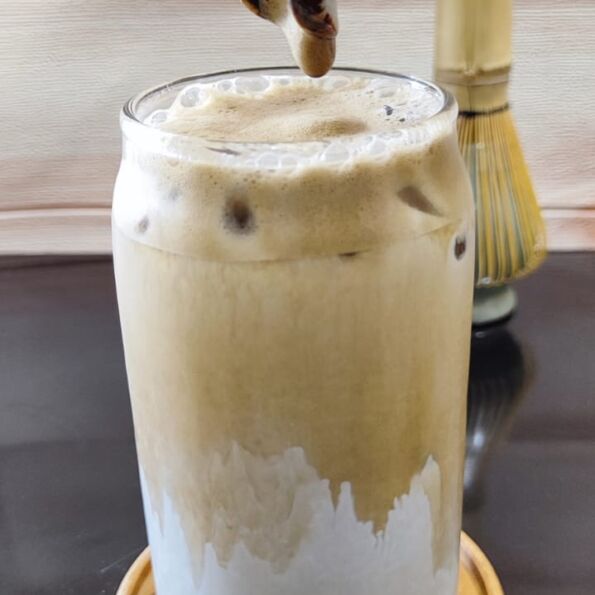
Iced Hojicha Latte

In the scorching heat of summer, there's nothing quite as refreshing as a well-crafted iced beverage. While iced coffees and teas are popular choices, let's delve into the realm of Japanese tea culture and discover the exquisite Iced Hojicha Latte. This delightful fusion of earthy hojicha and creamy milk, served over ice, is sure to tantalize your taste buds and cool you down on even the hottest days. Join me as we explore the ingredients, steps, and secrets to concocting this cooling delight right in your own kitchen.
With just a few simple ingredients and easy-to-follow steps, you can elevate your summer beverage game with a homemade Iced Hojicha Latte. Whether you're lounging on the patio or hosting a gathering with friends, this refreshing drink is sure to impress. Experiment with different milk alternatives and sweeteners to customize your latte to your liking. Embrace the tranquility of Japanese tea culture and treat yourself to a cooling delight that's as delightful to make as it is to drink. Cheers to summer sipping!
Immerse yourself in a culinary exploration of recipes perfectly suited for you.
The Iced Hojicha Latte boasts a harmonious blend of smoky, nutty undertones from the roasted hojicha powder, subtly balanced with creamy sweetness from the milk, culminating in a refreshing and satisfying beverage experience.
- 3-5 gr hojicha powder
- 15 ml sugar syrup
- 50 ml hot water
- 150 ml milk
- Ice cubes
Begin by measuring out 3 to 5 grams of hojicha powder, ensuring it's of good quality for a rich flavor profile.
In a small bowl or cup, combine the hojicha powder with a sugar syrup.
Pour the hot water over the hojicha powder and sugar syrup mixture.
Vigorously whisk with chasen the hojicha mixture until it becomes frothy and well-combined.
Once the hojicha mixture is frothy, fill a glass with ice cubes. Slowly pour the milk over the ice cubes.
Finally, carefully pour the frothy hojicha mixture over the milk and ice. The layers of milk and hojicha blend together beautifully, creating an enticing marbled effect.
Servings 1
- Amount Per Serving
- Calories 130kcal
- % Daily Value *
- Total Fat 3.1g5%
- Saturated Fat 1.8g9%
- Cholesterol 12mg4%
- Sodium 81mg4%
- Potassium 95mg3%
- Total Carbohydrate 21.4g8%
- Sugars 6.7g
- Protein 4.9g10%
- Calcium 181 mg
- Iron 0.02 mg
- Vitamin D 1 IU
* The % Daily Value (DV) tells you how much a nutrient in a food serving contributes to a daily diet. 2,000 calorie a day is used for general nutrition advice.
- Invest in high-quality hojicha powder for the best flavor.
- Use quick, vigorous motions with the bamboo whisk to create a frothy texture in the hojicha mixture. Practice whisking until you achieve a smooth and consistent foam.